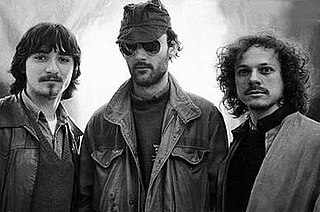
Azra was a Yugoslav rock band that was one of the most popular acts of the Yugoslav new wave music of the 1980s. Azra was formed in 1977 by its frontman Branimir "Johnny" Štulić. The other two members of the original line-up were Mišo Hrnjak (bass) and Boris Leiner (drums). The band is named after a verse from "Der Asra" by Heinrich Heine. They are considered to be one of the most influential bands from the Yugoslav new wave rock era and the Yugoslav rock scene in general.

Croatia Records is a record label in Croatia owned by AUTOR d.o.o., based in Zagreb.

Parni Valjak is a Croatian and Yugoslav rock band formed in Zagreb in 1975. They were one of the most popular acts of the Yugoslav rock scene, and have maintained large popularity in all former Yugoslav republics after the breakup of the country.
Film is a Croatian and Yugoslav rock band formed in Zagreb in 1978. Film is generally considered one of the most prominent acts of the Yugoslav new wave scene, as well as one of the most notable acts of the Yugoslav rock scene in general.
Branimir "Johnny" Štulić is a Yugoslav singer-songwriter, musician and author, best known for being the frontman of the popular Yugoslav rock group Azra. He is known for his charismatic stage performances and inspiring song lyrics that often combined rock poetry with a strong sense for social commentary, which is the cause for him becoming a cult figure.

Eto! Baš hoću! is the third studio album by Yugoslav rock band Bijelo Dugme, released in 1976.
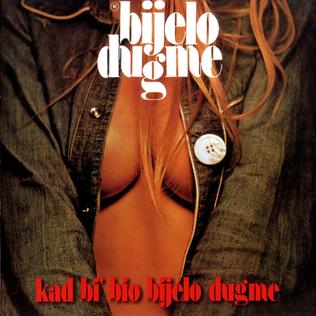
Kad bi' bio bijelo dugme is the 1974 debut studio album from influential Yugoslav rock band Bijelo Dugme.

Aerodrom is a Croatian and Yugoslav rock band formed in Zagreb in 1978. Formed and led by guitarist, vocalist and principal songwriter Jurica "Jura" Pađen, Aerodrom was a popular act of the Yugoslav rock scene.
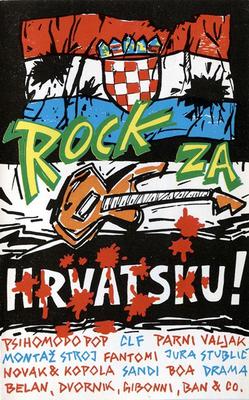
"The Best of Rock za Hrvatsku" was a popular compilation album of anti-war and patriotic songs released in 1992 during the Croatian War of Independence. Some of the contributing artists had been popular across the then recently defunct federation of Yugoslavia, namely Psihomodo pop, Jura Stublić, Parni valjak, Boa and Aerodrom's Jura Pađen. These artists took a pro-Croatian stance as the breakup of Yugoslavia and the Yugoslav Wars began, while others such as Azra did not participate because they disbanded and because of Branimir "Johnny" Štulić's publicly known frustrations with politics of the time.

Jurica Pađen is a Croatian and Yugoslav rock musician, known as the frontman and leader of Aerodrom and Pađen Band, as well as guitarist for the bands Grupa 220, Parni Valjak and Azra and a member of the supergroup 4 Asa.

Pokvarena mašta i prljave strasti is the second studio album from Serbian and former Yugoslav rock band Riblja Čorba, released in 1981.

Koza nostra is the tenth studio album from Serbian and former Yugoslav rock band Riblja Čorba, released in 1990.
Stulić or Štulić may refer to:
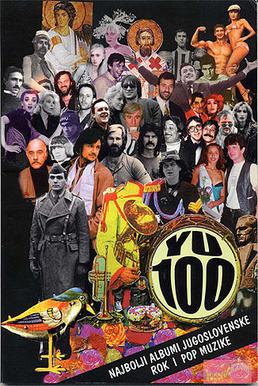
YU 100: najbolji albumi jugoslovenske rok i pop muzike is a book by Duško Antonić and Danilo Štrbac, published in 1998. It features a list of top 100 former Yugoslav popular music albums, formed according to the poll of 70 Serbian music critics, journalists, artists and others.

Sunčana strana ulice is the second studio album by the rock band Azra, released through Jugoton in 1981 on double vinyl.
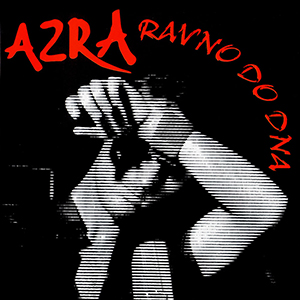
Ravno do dna is a live album of the Yugoslavian rock band Azra, released through Jugoton in 1982 on triple vinyl. It was recorded in club Kulušić, Zagreb on October 21, 1981.

Filigranski pločnici is the third studio album of the Yugoslavian rock band Azra, released through Jugoton in 1982 on double vinyl.

Singl ploče 1979–1982 is a compilation album by the Croatian rock band Azra, released through Jugoton in 1982. It collects ten tracks originally released between 1979 and 1982 as part of four non-album singles. Songs "Đoni, budi dobar" and "Teško vrijeme" are live versions and also appear on live LP Ravno do dna.

Kad fazani lete is the fourth studio album of the rock band Azra, released through Jugoton in 1983. It was recorded in Germany without two original members Mišo Hrnjak and Boris Leiner, who went to serve compulsory military service. Leiner was replaced on drums by Srećko Antonioli, while Štulić played guitar and bass.

It Ain't Like In The Movies At All is the sixth studio album of the Yugoslavian rock band Azra, released through Diskoton in 1986.

















